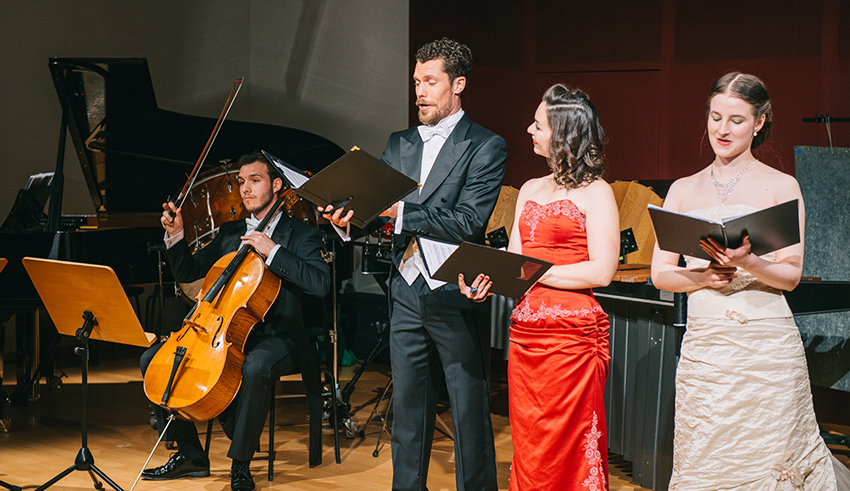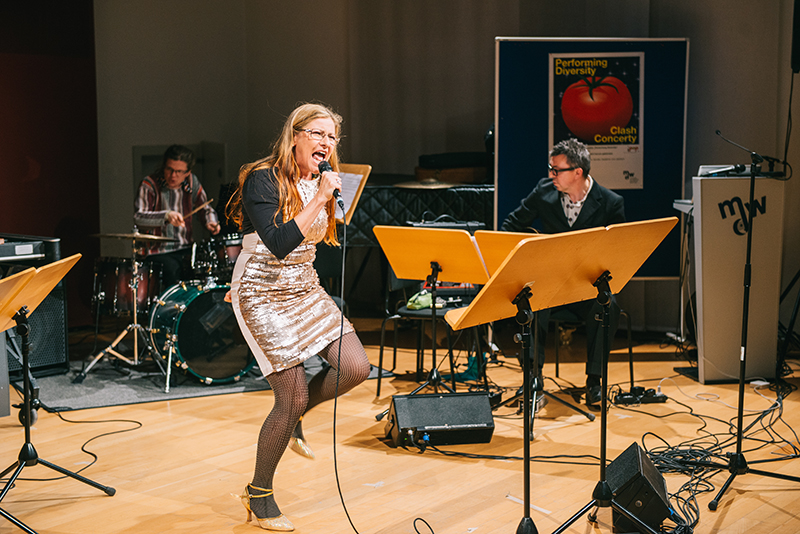Art and research connect at the Department of Popular Music: a survey of the research project Performing Diversity and a look back at the experimental concert Clash Concerty. Musikgenres verkehrt herum gebürstet: E-Schlager, U-Klassik, Impro-Pop on 29 April 2016.

The recent project Performing Diversity dealt with rituals of music performance. To this end, qualitative case studies were used to explore distinctions and diffusions between the stylistic fields of “classical/contemporary music”, “jazz / improvised music”, folk music / world music”, “dance / hip hop / electronic music”, “rock and pop music”, and “schlager / folky popular music”. The focus was on crossover phenomena in today’s musical landscape, with analysis being devoted to musical and cultural spaces-in-between where new things can come about. The team’s documentation and analysis of performance rituals was done with reference to images and sequences (music videos and live documentations). Their sample was comprised of Austrian musical, pictorial, and filmic creations from between 2010 and 2015. These included musical works by Austrian artists and bands such as Wanda, Fijuka, Electric Indigo, Nazar, Andreas Gabalier, Die Seer, Christian Muthspiel, Fatima Spar, ALMA, 5/8erl in Ehr’n, Bernhard Gander, and BartolomeyBittmann.
The main objective was to discern—based on analysis of the figures that appear in the theatrical setting of a musical performance—how the “constitution of culture” takes place. Alongside numerous retrospective tendencies, the researchers also ascertained a high degree of permeability between the stylistic fields. For in reality, the traditional and decidedly binary “serious/entertainment” music model has long since been replaced by a continuum between “elitist” and “popular” poles. And the reverent ritual of the concert, as well as the physically active animation ritual, no longer exist solely in their pure forms, but in a multitude of different mixtures.

Operationalising these findings artistically was the idea behind the experimental concert Clash Concerty. Musikgenres verkehrt herum gebürstet: E-Schlager, U-Klassik, Impro-Pop […Musical genres brushed backwards: serious schlager, entertainment classical, impro-pop] during the evening’s second half. The participating artists included mdw instructors and students as well as members of contemporary music ensemble Klangforum Wien and other guests.
Three songs from the Central European “schlager“ genre—“Sternenhimmelgefühl“ (Nockalm Quintett), “I sing a Liad für di“ (Andreas Gabalier), and “Heut heirat die Liebe meines Lebens“ (Die Seer)—were first performed in special arrangements for two sopranos, baritone, violin, cello, and piano according to the classical concert ritual: in clothing appropriate to high culture, with music stands, without spoken announcements, and followed by a typical three-part bowing ceremony.
There followed a performance of the composition wegda! (2011) by Bernhard Gander (with the composer present) arranged for electric jazz band. The painstakingly notated, politically controversial score was transformed into free spaces of rocklike improvisation and staged as a show act, with Patricia Simpson at the microphone and a band consisting of electricguitar, electric bass, electric piano, and percussion, while the audience was offered drinks and snacks.
To conclude the evening, these two live happenings (arranged by Harald Huber) were topped off by a complete concert performance of a work composed by Maria Gstättner in response to a commission of the 2016 styriarte festival. This work, based on the composer’s own text about being a woman, began as a contemporary classical piece and transitioned by way of more and more improvisation to ultimately become a pop song. The instrumentation included noisemakers and a new-fangled “concerteridoo” (world première!)—a souped-up digeridoo shaped like a wooden snail.
- Further information (in German) is available on the ipop website under “Fachbereiche –> Forschungsprojekte”: www.mdw.ac.at/ipop

